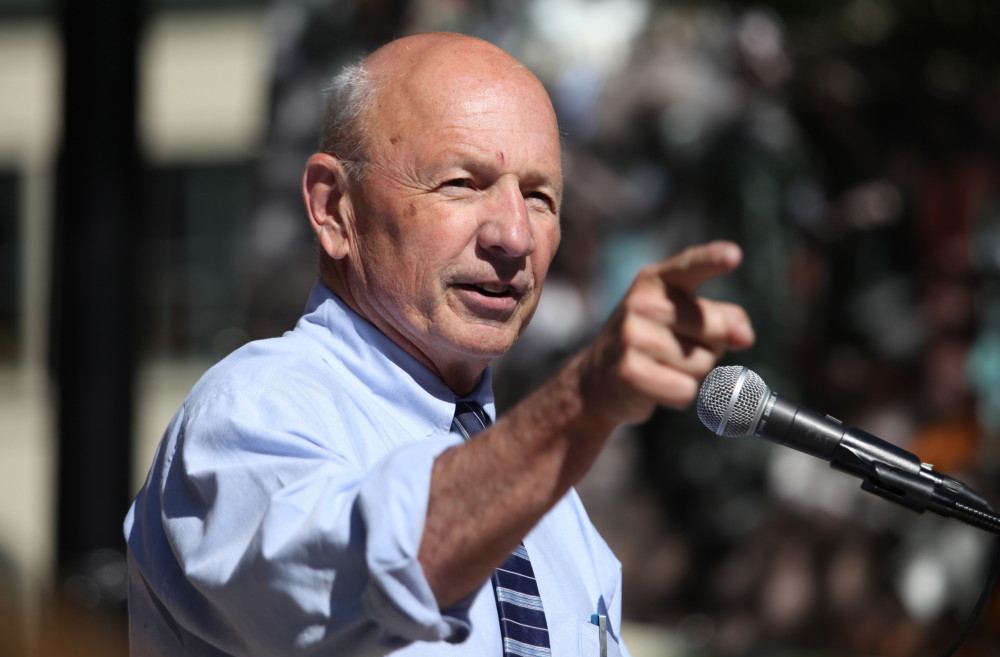Portland residents and business owners will have a chance to comment Wednesday evening on a proposal to increase the city’s minimum wage to $9.50 an hour next year as Mayor Michael Brennan pushes forward with a local wage hike in the absence of state or federal action on the issue.
Brennan and members of a minimum wage advisory group he created to analyze the issue will present his proposal for a tiered minimum wage increase and then solicit feedback during a 5 p.m. meeting at the Portland Public Library. Brennan said he hopes to make a formal proposal next month to the City Council but said the wage levels in his recommendation could change based on the feedback.
“That is the purpose of tomorrow’s meeting,” Brennan said Tuesday.
Under the current proposal, the local minimum wage would jump $2 to $9.50 an hour as early as Jan. 1 if councilors agree with the plan. The timeline calls for subsequent increases to $10.10 an hour in 2016 and $10.68 in 2017 followed by annual cost-of-living increases.
The plan would place Portland among a small but growing number of cities nationwide that are requiring wages well above the federal minimum of $7.25 an hour, which has not changed since July 2009. Maine lawmakers raised the state’s minimum wage to $7.50 per hour in October 2009.
Brennan, a former Democratic state lawmaker elected mayor in 2011, said he believes the timing and circumstances are right for a sizable increase.
“The economy (in Portland) is doing well, we are adding jobs and we have development in the city,” Brennan said. “I believe this is as good a time as any to raise the minimum wage to make sure that people who want to live and work in the city can afford to do that.”
Some business organizations have been cool to Brennan’s proposal.
“We believe the increase is too much, too fast,” said Greg Dugal with the Maine Restaurant Association and the Maine Innkeepers Association, two sectors likely to be disproportionately impacted by any increase, depending on how it is implemented with regard to income from tips. “We definitely don’t think it is something that can be absorbed.”
Federal data suggest that a small number of workers currently earn the minimum wage, although raising the level to $9.50 an hour would mean higher wages for a larger pool of individuals who earn more than the minimum but less than $10 an hour.
A full-time worker earning the current state minimum of $7.50 an hour would earn $15,600 for the year. According to the U.S. Census Bureau, just 5 percent of city residents working year-round in full-time jobs earned less than $15,000 in 2012 while 17.4 percent earned between $15,000 and $24,999. Roughly 13 percent of city residents working full time were estimated to earn more than $75,000.
The mean, or average, salary in Portland was $56,034 in 2012, according to Census estimates.
While progressives and some Democrats have been pushing to raise the minimum wage for years, President Obama elevated the issue nationally by including it in his past two State of the Union speeches. Democrats also see the issue as a winner headed into the fall elections.
Larger cities such as Washington, D.C., and San Francisco already set minimum wages higher than $10 an hour. In Seattle, business groups have turned to the courts to challenge a proposed $15 hourly minimum. Vermont lawmakers recently approved a plan to raise that state’s wage – already $8.73 an hour – to $10.50 an hour by 2018. And San Diego’s City Council voted this week to override a mayoral veto to increase the city’s minimum hourly wage in steps to $11.50 in 2017.
Brennan said his $9.50 proposal for next year is consistent with recommendations from some economists that the minimum wage fall between 50 percent and 60 percent of the median wage.
Chris O’Neil with the Portland Chamber of Commerce said there is no consensus among Chamber members about the impacts of a mandated wage hike. But both O’Neil and Dugal said any wage increase should be enacted at the state or federal level to avoid creating disparities between neighboring communities. And O’Neil said the discussion in Portland could put pressure on policymakers.
“The business community and specifically the Chamber of Commerce have not made a determination that raising the minimum wage is a bad thing,” O’Neil said. “We have determined that city government is the wrong jurisdiction for this.”
Send questions/comments to the editors.




Success. Please wait for the page to reload. If the page does not reload within 5 seconds, please refresh the page.
Enter your email and password to access comments.
Hi, to comment on stories you must . This profile is in addition to your subscription and website login.
Already have a commenting profile? .
Invalid username/password.
Please check your email to confirm and complete your registration.
Only subscribers are eligible to post comments. Please subscribe or login first for digital access. Here’s why.
Use the form below to reset your password. When you've submitted your account email, we will send an email with a reset code.